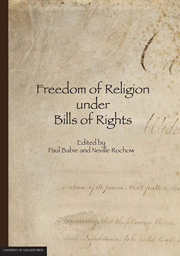Book contents
- Frontmatter
- Contents
- Acknowledgments
- List of Contributors
- Foreword by The Hon Sir Anthony Mason AC KBE: Human Rights and Courts
- INTRODUCTION
- 1 Protecting Religious Freedom under Bills of Rights: Australia as Microcosm
- SETTING THE SCENE
- CONTEMPORARY FREEDOM OF RELIGION ISSUES
- COMPARATIVE EXPERIENCE WITH FREEDOM OF RELIGION
- TABLE OF LEGISLATION AND INTERNATIONAL INSTRUMENTS
- INDEX
1 - Protecting Religious Freedom under Bills of Rights: Australia as Microcosm
from INTRODUCTION
Published online by Cambridge University Press: 05 June 2013
- Frontmatter
- Contents
- Acknowledgments
- List of Contributors
- Foreword by The Hon Sir Anthony Mason AC KBE: Human Rights and Courts
- INTRODUCTION
- 1 Protecting Religious Freedom under Bills of Rights: Australia as Microcosm
- SETTING THE SCENE
- CONTEMPORARY FREEDOM OF RELIGION ISSUES
- COMPARATIVE EXPERIENCE WITH FREEDOM OF RELIGION
- TABLE OF LEGISLATION AND INTERNATIONAL INSTRUMENTS
- INDEX
Summary
While the world undergoes a religious revival, the protection of religious freedom, particularly of minority religious groups, seems increasingly under threat. Most religious scholars report that religious liberty is ‘treading water at best, retreating at worst’. According to the Pew Forum on Religion & Public Life, nearly 70 per cent of the world's 6.8 billion people live in countries with high restrictions on religion. Religious constraints take two forms: ‘official curbs on faith and … hostility that believers endure at the hands of fellow citizens’. All of this is troubling, especially in light of the fact that the Universal Declaration of Human Rights (UDHR), one of the great international breakthroughs in the protection of human rights, came only in the last century. From any perspective, human rights, and especially religious freedom, appear to be under threat, making current both its international status and domestic protection through constitutional or other legislative means.
While many do, not every democratic state provides the comprehensive protection for human rights including religious freedom — found at the international level. Australia's record, for instance, serves as a microcosm of the international debate about protecting religious freedom using constitutional or legislative instruments in an attempt to balance the collective, the community, the society, against the individual, the group, the minority. And the Australian experience demonstrates, perhaps most dramatically, the discordance that can exist between domestic and international protection.
- Type
- Chapter
- Information
- Freedom of Religion under Bills of Rights , pp. 1 - 11Publisher: The University of Adelaide PressPrint publication year: 2012

